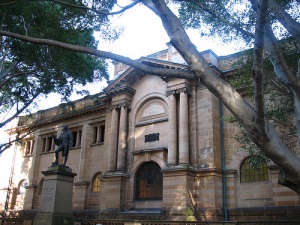A few weeks back on the Recordkeeping Roundtable blog I reported in Part 1 of this story on the efforts of Tom Twiss and the rest of the Social Responsibilities Round Table group in the American Library Association to have three resolutions passed by the ALA's general membership meeting relating to WikiLeaks, Bradley Manning and the importance of free speech, free press and the openness and accountability of government.
 State Library of NSW Mitchell Wing: Photo credit Kate's Photo Diary
State Library of NSW Mitchell Wing: Photo credit Kate's Photo Diary
Now, closer to home, it's great to be able to report on another librarian who is making the connection between his work and the mission of WikiLeaks, the newly appointed State Librarian of New South Wales, Dr Alex Byrne. Dr Byrne has contributed an article in the latest issue of Archives and Manuscripts, the Australian Society of Archivists' journal, a scan of which is provided below. The article, 'Wikileaks and Web 2.0: privacy, security and other things that keep me awake', challenges some of the information sciences' long held assumptions about privacy and confidentiality, security and integrity and authority - using the rise of social media and other web 2.0 technologies and WikiLeaks as two examples of the seismic shifts in expectations and possibilities in these areas.
Of course I'd recommend reading the whole piece but here are a few observations from Dr Byrne that touch on many of the issues that we explored at our Roundtable WikiLeaks event in March, which Tom and his colleagues at the ALA are concerned with, and which I believe any information professional will ignore at his or her peril.
In his article, reflecting on the CableGate releases, Byrne notes: "the disclosures have other lessons for memory institutions. Above all, they forcefully demonstrate that there are new agencies entering into the management and dissemination of records on a large scale. .. WikiLeaks has introduced a new agency, one which will accept leaked documents anonymously, assess them, possibly redact elements, compile guides and summaries, and publish facsimiles of the documents on a public website for all to see. And that access is guaranteed against blockage or legal prohibition by the mirroring of WikiLeaks on 1,426 sites, as at the end of 2010.
Meanwhile, government archives continue to manage records in accordance with accepted practice and protocols and the application of 25 year, 30 year or longer embargoes on access. The contrast is stark and to the detriment of the official archives in the face of widespread expectations of openness and participation. No amount of huffing and puffing by leaders of government or officials will reverse those growing expectations."
Many of us here in Australia have noticed the marked split between official government condemnation and broadly based public support for WikiLeaks and their work. While not limiting his observations to Australian supporters, Byrne notes: 'Other implications of CableGate can be seen in the rapid call to arms to support WikiLeaks when the organisation was threatened by removal of financial services by MasterCard and Visa ..The strength of the responses illustrated not only the depth of feeling in favour of openness but also the effectiveness of social media such as Twitter in promoting an online petition, support for the organisation and its founder, and attacks on MasterCard and Visa for attempting to prevent donations to the organisation, allegedly at the behest of the US Government.'
Byrne also makes some great points about the difference we see now between the ubiquity of online information, and expectations of access as compared with what Archives New Zealand has termed 'practical obscurity' - that is, the negative effect on the use and effectiveness of information as a result of being kept in physical form in boxes in a repository, perhaps poorly indexed and almost certainly in an inconvenient geographic location (owing to the need for large areas of space). When you think of what could be achieved by making legacy archival materials accessible online in the way that WikiLeaks does - dependent of course in the government sector upon sizeable boosts to archives institutions' budgets - possibilities for citizen engagement and understanding of their governments expand exponentially.
Read the full article here: 'Byrne, Alex 'WikiLeaks and Web 2.0' Archives and Manuscripts, Vol 29 No 1 May 2011 (PDF, 7.32 MB)
Theme by Danetsoft and Danang Probo Sayekti inspired by Maksimer